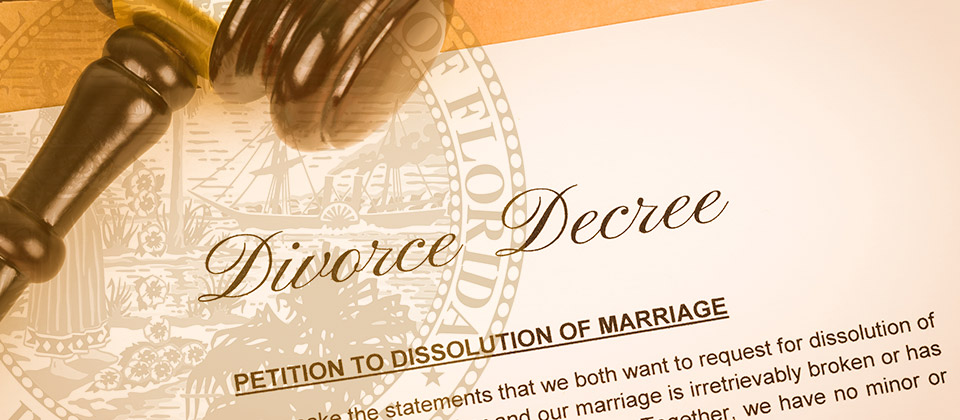Guide to Florida Divorce Records

Nobody wants to get divorced. However, the gravity of divorce means its effects will appear in nearly half of couples' lives, and you'll need the right information to get your Florida divorce records to restore your single life.
Divorce records solve many chores and problems that follow a marriage's end. They assist in legal name changes, getting remarried, and confirming custody arrangements. Most importantly, they are a vital source of context that shows both spouses' situations at the time.
Knowing what these records contain and how to obtain them is vital to preparing yourself for the likely aftermath of divorce.
What are Florida Divorce Records?
Florida divorce records encapsulate a broad range of information outlining the divorce process. They capture any document submitted or created during the case and include information on factors like the grounds for divorce, court transcripts, and the final judgment.
Depending on the applicant's needs, these records can be requested piecemeal or as an entire court case file. Divorcees cannot order their records through a random court, as divorce records are kept solely by the county where the divorce occurred.

Dissolution of Marriage Certificates (Divorce Abstracts)
The Florida Bureau of Vital Statistics keeps Dissolution of Marriage Certificates, also known as divorce abstracts, dating back to June 6, 1927.
Abstracts don't include official documents like a full record but function as a summary of the proceedings. They contain the names of the spouses, the divorce filing date, the overseeing county name, and the case number.
In most cases, the Dissolution of Marriage Certificate is enough to prove your divorce for financial, governmental, or legal purposes. However, you'll need the complete divorce record to investigate your case comprehensively.
What's Inside the Divorce Record?
The information within a divorce record is determined by how drawn out and complex the original case was. A short, amicable divorce will likely only include some financial documents and the termination papers. However, the record becomes quite extensive if there are multiple pleadings or contests.
Typical topics covered in the divorce record include:
- Final Judgment – The document signed by the presiding judge that legally dissolves the marriage.
- Affidavit – Florida Family Court requires both spouses to submit a complete audit of their financial information. This applies to joint and individually owned accounts as well as likely future earnings such as retirement, life insurance, and tax returns.
- Alimony Payments – Also called spousal support, alimony outlines one spouse's economic obligation to the other. Florida law awards alimony as needed and only if the other spouse can pay. The length of support is proportional to the duration of the marriage.
- Child Custody – Minute details of child custody are solidified in the divorce record. Factors like the primary caretaker, visitation rights, and child support payments are clearly described in these papers.
- Division of Assets – Florida law's ideal is the equitable distribution of marital property, which refers to assets AND debts accrued during the marriage.
Omissions and Errors in Divorce Records
A million things happen during a whirlwind divorce, and not everything is always addressed. If an asset was omitted in one or both spouses' Affidavits and isn't awarded to either, it becomes an "undivided asset".
Rectifying something like this is one of the reasons you may need your complete Florida divorce record rather than the certificate. You'll need to review the entire case and decide if you want to go through the grueling court process again.
A more contentious problem would be errors in a Florida divorce record. Even a minor error has lasting consequences on one spouse's alimony payments or may even cost them their rights to that significant asset.
Divorce Statistics in the State

Florida is the third most popular wedding destination in the US but is also home to a similar volume of divorces. Diligently tracking divorce statistics is the Government's responsibility. It allows policymakers to guide family law and social programs in the right direction.
Some of the most pertinent divorce statistics include:
- Divorce Rate – Along with Idaho, Florida has the 6th highest divorce rate in the country, with 3.4 divorces per 1000 people. The state's high remarriage rates hurt these numbers since second and third marriages are far more likely to end in divorce.
- Divorces with Children - Between 30 to 40 percent of Florida divorces involve minors.
- Divorce over 50 – Although later divorce rates were always high, they've doubled in Florida over the past 30 years. Some demographers believe this is due to Florida's rising senior and retired population.
- Reported Reasons for Divorce – Most divorces in Florida are filed as "no-fault". However, surveys of divorcees say that the most common reasons for calling it quits include addiction, criminal behavior, adultery, domestic abuse, and financial difficulties.
- Who Initiates Divorces – Women initiate the overwhelming number of divorces in Florida at 75 percent. This trend is historically tied to women's economic freedom and education levels.
- Average Length of Marriages – First marriages in Florida last a median length of 20.4 years. Spouses may be more motivated to stick it out for at least 17 years, as that's when the possibility of permanent alimony sets in.
How to Find Florida Abstracts

Let's start with obtaining a divorce abstract since that is usually sufficient. These are obtained through the Florida Bureau of Vital Statistics through walk-in and mail requests. Regardless of your chosen method, you must fill out form DH260 Application for Dissolution of Marriage.
If ordering through mail, you must enclose the exact fee as a check or money order payable to "Vital Statistics". Mail orders are inherently riskier because unforeseen fees or extra searches may cause the request to be abandoned.
- Search fee and first certificate: $5
- Extra certified copies: $4 per copy
- Searching additional years if date unknown: $2 per year (max. $50)
- Shipping & Handling Fee: $1
- Rush Order: $10
To avoid getting the price wrong, you must know the divorcee's exact name and the year of divorce. Double-check your application's spelling before mailing it to Florida Bureau of Vital Statistics, PO Box 210, Jacksonville, Florida 32231-0042.
Applicants can also walk into the state offices at 1217 N Pearl Street, Jacksonville, Florida. The required information is nearly identical to mail orders, but cash and card payments are accepted. If you need your divorce decree immediately, we recommend visiting in person since you have a good chance at a same-day turnaround.
Locating Florida Divorce Records
Complete divorce records are kept only by the Clerk of the county's Circuit Court where they took place. Each county's process may use slightly different forms, but the required information shouldn't change. You'll need the following:
- Full names of spouses after divorce
- Full names of spouses when married
- Date of divorce
- Case number
- Valid government photo ID
We recommend calling the county before making a trip or sending a mail request. It's possible it allows computer certification and can process you over the phone. If not, they can provide the exact steps for ordering through their county.
Florida Circuit Court Clerk Contact Directory
Government websites are a nightmare to navigate, and their offices don't always pick up the phone. It's best to reach out through email and phone for the best odds of a response. We've listed the official pages for the county clerk's office for the top ten most populous Florida counties.
| County | URL |
|---|---|
| Miami-Dade County | Juan Fernandez-Barquin |
| Broward County | Brenda D. Forman |
| Palm Beach County | Joseph Abruzzo |
| Hillsborough County | Cindy Stuart |
| Orange County | Tiffany Moore Russell |
| Duval County | Jody Phillips |
| Pinellas County | Ken Burke |
| Lee County | Kevin C. Karnes |
| Polk County | Stacy M. Butterfield |
| Brevard County | Rachel M. Sadoff |
FAQ on Divorce Records in Florida
What's the difference between a divorce record and divorce abstracts?
Florida Vital Statistics offers divorce abstracts, which are separate documents with limited details on a divorce. These are used to prove divorce to government offices and financial institutions.
Divorce records refer to a far more comprehensive number of documents that detail everything about a divorce from beginning to end. Every piece of submitted evidence and court transcript falls under the umbrella of a divorce record.
Do I need my divorce records to remarry in Florida?
You do not need the complete divorce record but must at least have the divorce abstract to remarry in Florida. There is no waiting period for remarriage in Florida after divorce, but couples must wait three days after receiving their new marriage license to hold the ceremony.
Do I have to pay a fee to get my divorce record in Florida?
The county clerk's office charges a small fee for your divorce records, which may increase alongside how hard the records are to find. Applicants should expect to pay between $10 and $20 when visiting in person.
Ordering abstracts from the Vital Statistics Department will use the following breakdown:
- Search fee and first certificate: $5
- Extra certified copies: $4 per copy
- Searching additional years if date unknown: $2 per year (max. $50)
- Shipping & Handling Fee: $1
- Rush Order: $10
Can I change the terms of a divorce decree?
Florida permits divorcees to petition a decree for one year after it is finalized. This is enough time to see if the decided terms are viable in practice or if there are other factors to consider. However, overturning a divorce decree requires substantial proof and can be grueling.
Can anyone request a divorce record in Florida?
Florida divorce abstracts are public records and do not require identification or proof of relation in the application process. However, complete divorce records are much more difficult to access and are typically restricted to the ex-spouses, direct family, and their legal representatives.
